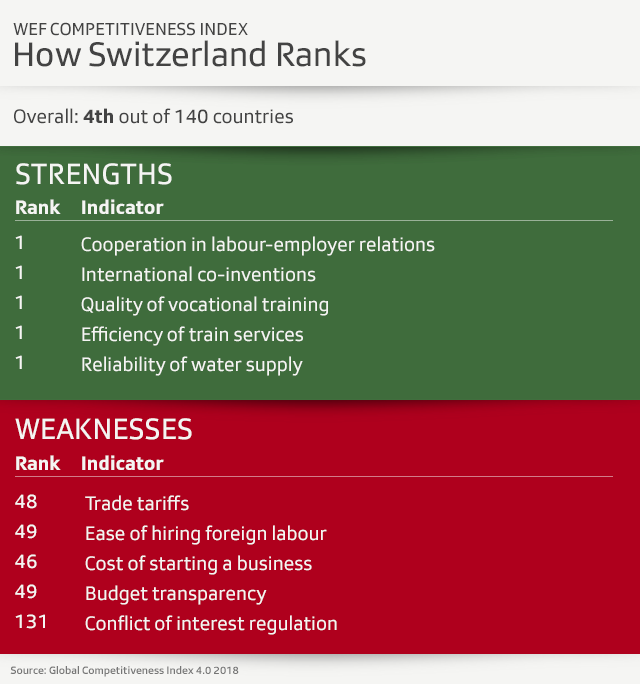
More than 100 countries out of the 140 ranked in the WEF Global Competitiveness Index score lower than 50 (out of 100) in the area of innovation capabilities.
A major update to the World Economic Forum’s annual Global Competitiveness Index reveals that the global economy is ill-prepared for the transformation brought on by technology disruption.
While the United States comes the closest to the “competitive frontier” taking the top spot in the ranking, the WEF warns that government policies need to catch up to prevent rapid technological change from becoming a drag on competitiveness. Around three-quarters of economies lack sufficient innovation capabilities, impacting economic competitiveness according to the study.
The annual Index, launched on Wednesday, assesses national competitiveness for 140 economies through the factors that determine an economy’s level of productivity including institutions, infrastructure, business dynamism among other areas.
Evolving concept of competitiveness
The Geneva-based WEF revamped the Index to reflect the changing nature of economic competitiveness in the age of rapid innovation and digital technologies defining the Fourth Industrial Revolution that are creating a new set of challenges for governments and businesses. (See box) It argues that these challenges run the risk of having a negative impact on future growth and productivity.
Many of the factors that will have the greatest impact in driving competitiveness in the future have never been the focus of major policy decisions in the past. These include idea generation, entrepreneurial culture, openness, and agility.
The Fourth Industrial Revolution is disrupting economies and societies by redefining the way we work, live and interact with each other. According to the WEF, this offers the potential to leapfrog stages of development – but it also makes the pathway to development less certain.
Competitiveness Index 4.0
In the fourth major overhaul since the Index’s launch in 1979, the Index reflects a new understanding of competitiveness in the era of rapid and transformative innovation. Some 60% of this year’s 98 indicators are new to include an economies’ readiness for the future, social capital, endowment of disruptive businesses, internet usage, among other areas. Using a scale from 0 to 100 for each indicator, the Index shows how close the economy is to the ideal state or “frontier” of competitiveness.
end of infobox
Closing in on the competitiveness frontierSwitzerland came in fourth overall behind the US, Singapore, and Germany and just ahead of Japan. The country topped the ranking for the past nine years based on the previous methodology (version 3.0). This drop in the ranking is more a reflection on methodological changes than a worsening of Switzerland’s own performance. One area where Switzerland performs relatively well is in innovation capability coming in third overall behind Germany and the US. It ranks first for international co-inventions, and second for multi-stakeholder collaboration. Globally, the Index found relative weakness across the board when it comes to mastering the innovation process, from idea generation to product commercialization. Some 103 countries score lower than 50 out of 100 in this area of the Index. Switzerland also excels when it comes to the labour market, with the best quality of vocational skills in the world. Efficiency of train services and reliability of water supply are also key strengths for the country. Where it falls short is in market openness. It ranks 16th in the product market category, which captures how well the country provides an even playing field for companies to participate in its market. It bottoms out the ranking when it comes to complexity of tariffs and ranks 48th on trade tariffs. The negotiation of new trade deals has been a key priority for the Swiss government in recent months. This week Switzerland’s top trade diplomat is in Washington to hold talks about a possible free-trade agreement with the US. Swiss Economics Minister Johann Schneider-Ammann has also been advancing free-trade negotiations between South America’s Mercosur bloc and the European Free Trade Association. The country also shows gaps in business dynamism including the cost and time to start a business – areas where the US does well. |
WEF Competitiveness Index |
Calls for openness and inclusion
In the wake of rising trade tensions, the WEF calls for governments to resist protectionist measures driven by short-term interests and instead calls for greater openness to boost competitiveness and long-term growth. The report states, “the pursuit of national competitiveness does not undermine global cooperation—indeed, openness contributes to competitiveness.”
The findings also present a strong argument for policies such as safety networks and progress taxation to improve conditions of those adversely affected by globalisation within countries. While technology has the potential to improve development, Saadia Zahidi, Member of the Managing Board and Head of the Centre for the New Economy and Society WEF, argued in a press release, “it is not a silver bullet on its own. Countries must invest in people and institutions to deliver on the promise of technology.”
Full story here Are you the author? Previous post See more for Next postTags: Business,newsletter






















